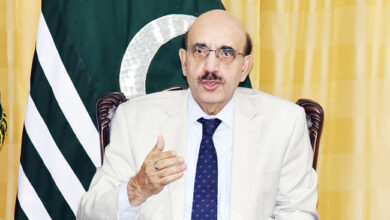UN chief adds voice to calls for release of Kashmiri prisoners in occupied Kashmir

UNITED NATIONS, Apr 06 (APP): UN Secretary-General Antonio Guterres Monday called for a “very close look” at the continued incarceration of Kashmiris prisoners in Indian occupied Kashmir amid growing cases of the deadly coronavirus, as six leading international human rights organizations jointly demanded their immediate release.
“The secretary-general, as we have said before, believes that member states need to take very close look at incarcerations during a time of Covid-19,” his spokesman, Stephane Dujarris said in reply to APP’s question about the joint call for the release of “arbitrarily arrested” Kashmiris by the Geneva-based World Organisation Against Torture, Paris-based International Federation for Human Rights, the Johannesburg-based CIVICUS, the Manila-based Asian Forum for Human Rights and Development, the Geneva-based International Commission of Jurists, and the London-based Amnesty International.
The spokesman also said that the United Nations High Commissioner for Human Rights, Michelle Bachelet, had also called on governments to “examine ways to release those particularly vulnerable to COVID-19, among them older detainees and those who are sick, as well as low-risk offenders.”
As for the situation in Kashmir, the spokesman said that the secretary-general “very much believes that any political solution must take into consideration the issue of human rights.”
Noting the recent steps taken by Indian authorities to decongest prisons, the joint statement issued by the six human rights organizations said, “The fate of hundreds of arbitrarily detained Kashmiri prisoners hangs in the balance as the number of confirmed cases of coronavirus in India passes the 4,000 mark and many more are likely to remain undetected or unreported.
“Inmates and prison staff, who live in confined spaces and in close proximity with others, remain extremely vulnerable to COVID-19. While the rest of the country is instructed to respect social isolation and hygiene rules, basic measures like hand washing – let alone physical distancing – are just not possible for prisoners.
“Under international law, India has an obligation to ensure the physical and mental health and well- being of inmates. However, with an occupancy rate of over 117%, precarious hygienic conditions and inadequate health services, the overcrowded Indian prisons constitute the perfect environment for the spread of coronavirus.
“In a bid to contain the spread of the disease among inmates and prison staff, the Supreme Court asked state governments on 23 March 2020 to take steps to decongest the country’s prison system by considering granting parole to those convicted or charged with offences carrying jail terms of up to seven years…
“However, there is a concern that hundreds of Kashmiri youth, journalists, political leaders, human right defenders and others arbitrarily arrested in the course of 2019, including following the repeal of Article 370 of the Indian Constitution on 5 August 2019, (which provided special status to Jammu and Kashmir) will not be among those benefiting from the measure.
“Human rights groups and UN experts have repeatedly called for the release as a matter of priority of “those detained without sufficient legal basis, including political prisoners and others detained simply for expressing critical or dissenting views.”
Last month, the Ministry of Home Affairs revealed that 7,357 persons had been arrested in Jammu & Kashmir since 5 August 2019, when India annexed Kashmir. While the majority have since been released, the statement said hundreds are still detained.





